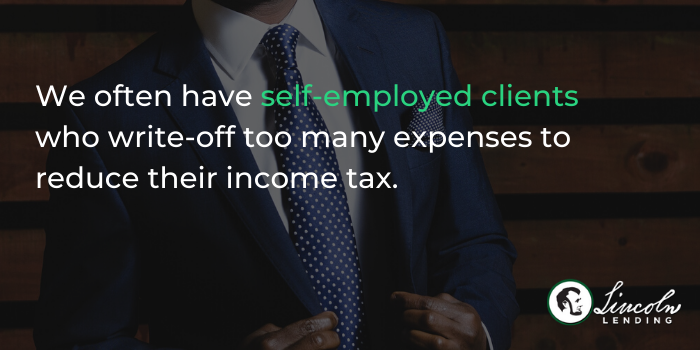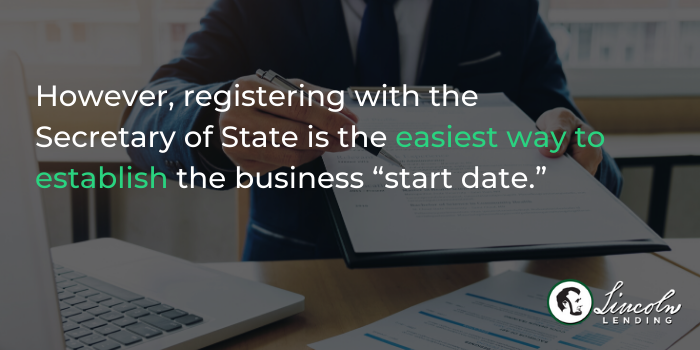Oklahoma business owners have unique issues they must consider when buying a home. Lincoln Lending brings extensive experience and a variety of services to specifically assist those who are self-employed or own businesses in the OKC metro area and beyond. In this article, we’re sharing are a few scenarios that we’ve seen that made it hard for business owners to secure a home loan. We’re also sharing a few steps that our clients have taken that made it much easier for them to qualify for a loan.
Read on for some dos and don'ts that will make your loan qualification easier.
DON'T: Take Too Many Tax Write-Offs
We often have self-employed clients who write off too many expenses to reduce their income tax. Unfortunately, the reduction in their debt level negatively impacts the income side of their debt-to-income ratio. 
In these cases, we usually ask them to let us look at their last two tax returns. Why? We can use the past two tax returns to calculate how much income they need to show their upcoming tax return in order to qualify for their desired loan. While it may take a little longer to secure their home loan, they’ll be able to qualify for a large enough loan to get their dream home.
DO: Register Your Business Early
We had a client that came to us and said that he wanted a new home, but that he wasn’t in a rush. He understood that he would need two years of history for his new business before he could qualify for a home loan.
We told him that one of the most important things that he could do is to register his business as soon as possible with the Secretary of State. The business registration establishes a start date for the business. There’s an important distinction that business owners must know: your business has to be registered with the Secretary of State for at least two years to qualify for a loan, but it does not have to show a profit for two years of tax returns.
In this case, the borrower only claimed one and a half years of income on his tax returns. However, he was able to qualify for a loan because he’d registered his business with the Secretary of State right away and had a two-year business history by the time that he applied.
For example:
If you started your business in June of 2017, your business would be two years old in June of 2019. However, if you didn’t register with the Secretary of State in June of 2017, we don’t have any way to prove that you started the business in June.
We have to assume that you could have started the business on December 31, 2017. So, if the current date is June 2019 and we have to use a business start date of December 2017, we lose about six months of your income.
Just because there is business income on two years of tax returns does not automatically mean your business has been in existence for two years. We have to prove that the business has actually been in business for two years in order to count any of the income. In some cases, we may be able to use documentation showing when you opened a business bank account. However, registering with the Secretary of State is the easiest way to establish the business “start date.”

If we can’t document the business start date, we have to wait for your 2019 income tax filing so that we can show 2017, 2018, and 2019 tax returns to prove the business has existed for at least two years.
DO: Investigate ALL of Your Loan Options
There’s often more than one type of loan from which business owners can choose. Before giving up or putting off your home purchase, make sure that you investigate all of your loan options.
Bank Statement Loan
Self-employed folks who write off too much may qualify for a bank statement loan. If you can show 12 months of bank statements with regular deposits, we may be able to use those deposits to calculate an average income instead of using your tax returns to determine your net income.
Asset Loan
If you have a lot of liquid assets (i.e. money in the bank, 401k, mutual funds), then there is a loan program that allows us to use those assets to calculate your income. We divide your asset value by 360 months and use that number as income to qualify you for a 30-year mortgage.
For example:
You have one million dollars in liquid investments. It is earning great returns so you don’t want to cash it out and use it to buy a home. You would rather get a low interest rate mortgage to buy the home. We’ll take $1,000,000 divided by 360 months to get $2,777.77, which we can then use as your per month income.
DO: Plan Ahead
Ideally, business owners should meet with a lender two years before they want to buy a house. If that isn’t possible, know that you will need to prove two years of business existence to qualify for a home loan. 
It is also good for business owners to meet with a lender prior to the next tax season to make a plan for how much to write off or not write off. Tax write-offs can help reduce your yearly taxes, but they can also negatively affect your ideal debt-to-income ratio to qualify for a home loan.
DO: Learn from My Personal Experience
I have personally purchased two houses as a self-employed business owner, so I understand the ins and outs of the entire process. The first time, I needed a co-signer because the business was new and the income was limited. Later, when the business was established and making money, we could either refinance the loan without the co-signer, or we could qualify for another house. We qualified for another house.
DO: Choose a Lender You Can Trust
Business owners trust Lincoln Lending because of our experience, knowledge, and depth of understanding of the ins and outs of being a self-employed business owner.
Take advantage of our no-cost, no-obligation coaching session to review your unique situation by clicking below.


